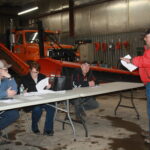
FORT FAIRFIELD, Maine — The results of a recent family survey are fueling efforts by SAD 20 and the Fort Fairfield community to establish a universal child care center within the district.
After meeting with parents and community officials in August, SAD 20 sent a survey to families about their current child care situation. More than 100 parents completed the survey, with 70 percent reporting that the lack of reliable child care has negatively affected their ability to work outside the home.
Among the respondents, 95 percent said they do not think Fort Fairfield families have adequate access to child care and 98 percent said their employers do not provide child care options. Sixty-one percent of parents do not have reliable child care for their children, whether from family members or a child care center.
“The [survey] results aren’t that surprising, but they are telling,” said SAD 20 Superintendent Tim Doak during a public meeting on Thursday. “Not having child care is preventing people in our community from providing for their families.”
Recently Doak drafted an initial plan for a child care center that would be built on property adjacent to Fort Fairfield Elementary School. Though potential project costs are still being estimated, the building would be around 5,000 to 6,000 square feet and provide learning spaces for infants, toddlers and preschoolers.
The center would rely on “wrap-around services,” which means SAD 20 would use existing resources, such as teachers and staff, food services, technology, behavioral specialists and early intervention for special-needs children.
Though Doak hasn’t officially submitted the final plan to the state, he has shared a version of it with Maine Education Commissioner Pender Makin, who expressed interest in taking Fort Fairfield’s plans to Gov. Janet Mills’ office.
With the U.S. Congress negotiating a $450 billion plan for universal child care, Doak hopes federal funds allocated to Maine could be approved for Fort Fairfield’s center. If not, he and the community will look at other grant funding options.
“The state is looking for outside-the-box thinking right now,” Doak said. “We’ve known for years in Aroostook County that having shared services is the way to go.”
Fort Fairfield is just one of numerous communities across Maine and the country that dealt with the lack of child care even before COVID forced schools into remote learning.
In 2019, Maine data showed that 8 percent of families were living below the poverty line, and that rate doubled to 15 percent for families with children under 5, Tara Williams, executive director of the Maine Association for the Education of Young Children, said.
The closure of child care centers and COVID-related quarantines have forced families into situations where one parent must stay home. And existing child care services are incumbent on parents, rather than being publicly funded like K-12 schools.
“Those families [living in poverty] are living within their lowest wage earning potential but we’re asking them to pay equal to a college education for child care,” Williams said. “Child care takes up seven to 14 percent of income for families with two parents working and 45 percent for single parents.”
But the pandemic has also increased awareness of child care issues, Williams said. Potential investment from the federal government could lead to Fort Fairfield developing a universal pre-K program that might serve as a pilot model for other schools in Maine.
So far, SAD 20’s child care plan has the support of several local and state legislators. State Sen.Trey Stewart, a Republican who represents District 2, said learning about Aroostook’s child care needs has convinced him that investing in those services will lead to more economic growth.
“If 70 percent of parents can’t find child care, that’s an economic development issue,” Stewart said, referring to Fort Fairfield’s survey. “If we don’t change child care, we’re going to be in trouble economically after COVID.”
Democrat David McCrea, state representative for District 148, cited data he heard at a recent national child care conference that 60 percent of child care facilities in the U.S. have shuttered since the pandemic began.
With no child care center in Fort Fairfield or nearby Limestone, many families have turned to centers such as Miss Jordyn’s Child Care and Preschool in Caribou, which has dealt with its own employee shortage and space limitations.
“So many talented employees are locked up at home taking care of kids when we could be providing wrap-around services for those kids and helping those parents work,” McCrea said. “I’m anxious to help [Fort Fairfield] in any way I can.”







